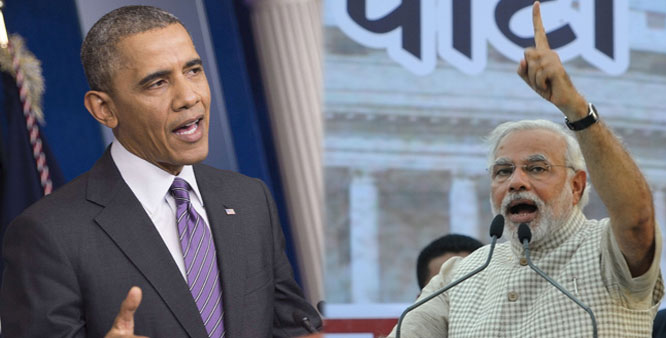PM Modi Visit to The US: Freeze or a Thaw?
Barack Obama and Narendra Modi

NEW DELHI: Prime Minister Narendra Modi is now preparing for his visit to the United States to address the United Nations General Assembly on September 27 as per the current schedule, and meet US President Barack Obama on September 30 in Washington.
The world’s eyes will be on the Indian Prime Minister who has managed to get the eyeballs for intense foreign policy engagement since coming to power, with US-India bilateral relations, however, remaining on an uncertain keel. Diplomatic corridors in both capitals are rife with speculation that PM Modi has still not forgotten, or forgiven Washington for denying him a visa for a decade after the Gujarat violence. In fact the visa restrictions were removed by the US formally only after Modi emerged victorious in the Lok Sabha elections, although US delegations had started calling on him before that in Gujarat.
Strangely enough Washington has still not replaced its last ambassador to India Nancy Powell who went out in the shadow of the Khobragade episode where the Indian diplomat was arrested by the US police for allegedly maltreating a domestic help. This, sources said, is significant considering the high level visit and the importance that is being attached to it.
That Washington too might not exactly be laying out the red carpet this time is apparent from the fact that the Prime Minister is not being invited to address a joint session of the US Congress as according to the US House Speaker John Boehner this could not be arranged because of the House calendar and schedule that could not be adjusted accordingly. The Americans use this address to honour visitors, and New Delhi had been optimistic that a similar invitation would be extended to the PM.
MEA officials have meanwhile arrived in Washington to make all arrangements for the visit. A final schedule will be thus available only after the discussions are complete.
India-US relations that had soared beyond all expectations under Prime Minister Manmohan Singh in his first term in office dropped considerably when he was unable to push through the US-India civilian nuclear energy agreement during his second term. Washington that had placed considerable faith in the UPA governments ability to get this through the opposition in Parliament was visibly, and vocally, disappointed.
Relations plummeted further after the new government has come to power with PM Modi making it clear, indirectly of course, that India has friends other than the US. The warm reaching out to China was a case in point at the onset, mitigated now by an even warmer visit to Japan recently. The PM’s statement about Russia was also seen and analysed as a message to Washington when he said, “if you ask anyone among the more than one billion people living in India who is our country’s greatest friend, every person, every child knows that it is Russia.”
While the PM will use the UN address to showcase himself and his policies to the carefully watching world, it remains to be seen how the Washington summit is being calibrated by him. Till now every foreign visit has followed a set agenda, with the nervous PM Modi in Brazil giving way to the confident, drum beating Prime Minister in Japan. The Minister of External Affairs Sushma Swaraj in fact, is barely in the picture with the PM not even taking her with him on the high level visits that he has handled according to his will. In fact, in characteristic style, it is the officials of the Ministry of External Affairs who have worked closely with the PMO in finalising the visits according to the Prime Ministers wishes with the Minister not visible in word or deed.
President Obama, concerned now with West Asia and Afghanistan, does want to smoothen relations with India and will use the visit to break the ice that seems to be coating bilateral relations at the moment. However, the usual statements and assessments that could have been expected to provide the backdrop of the PM’s first visit are missing with the US media not overly welcoming or friendly at this stage. In fact in most reports about the PM, the big American newspapers still draw attention to the Gujarat violence and the denial of the US visa to the Indian Prime Minister. Communal violence including Muzaffarnagar and ‘Love Jihad’ has also got considerable play in the US media.



